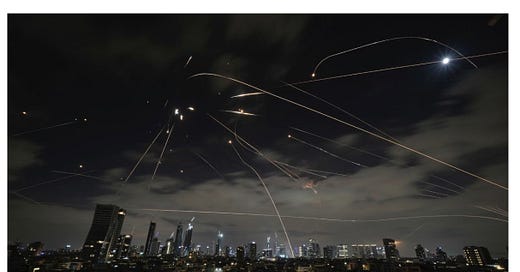Our hearts go out to everyone in Israel as you/we wait for Iran’s retribution. Our hats go off to the brave IDF fighters and military teams who have saved millions of lives by preventing a nuclear holocaust. We stand beside you in every way.
We would love to hear from you.
Are any of you in Israel now? Know someone who is and can share? We want to publish your/their essays and experiences.
Same for those of you who are not in Israel but have loved ones or close friends there or who are — like all of us — reeling from our Jewish family at large being under fire and want to share what that’s like for you.
Please comment on this post with your experiences or send us essays — even a short paragraph or sentence — to post or publish. We want to amplify your thoughts.
On Being Jewish Now is where to come for how it feels to be Jewish now. Not op-eds. Not political treatises. Your innermost thoughts like you’re talking to a friend over coffee. We want to connect.
Send to submissionsobjn@zibbymedia.com or just add to comments here.
Sending thoughts, prayers, love and support.





We live in one of the northern-most towns in Israel, in one of the places that was greatly affected by the Hezbollah attacks. We fled at the very beginning of the war and only recently returned. Ironically, since the initial attack against Iran, we have felt safer here than in central Israel, but are well aware that this could turn on a dime. We are just at the beginning of the Iranian cycle of this war and nobody knows what will transpire. The uncertainty is sickening.
The early alerts of incoming missiles that we receive on our mobile phones now slightly diminish the frantic urgency of the transition to our steel-reinforced safe room. Notwithstanding, our four-year-old granddaughter understands enough to be frightened, and she covers her ears and cries when our phones, yet again, let loose their ear-splitting warnings. She - and we - have not left the house in days. We stay as close to our safe room as possible.
When the sirens go off, we carefully close the heavy steel door. The four of us impossibly crowd into a double bed and we try to somehow make it fun for our little one. Sometimes she has slept through the thankfully distant but still very audible booms of the Iranian warheads. Other times, we have distracted her with children’s programs or her iPad.
This morning, I felt something akin to a panic attack. I vowed today to do my utmost to stop watching the news footage of destroyed homes and devastated families. I hope I succeed.
The old adage “one day at a time” has taken on a new meaning. I want to say that I don’t know how much more of this we can take. But we will, somehow. Thus far, we are truly the fortunate ones.
So...I am a poet and I process by writing poetry. My husband and I have been in NY for about a month for our daughter's college graduation and we were due to return home to Tel Aviv. Instead, now, we have no idea. We are lucky. We are alive; we are safe; we are Israeli-Americans; we can be here as long as need be. We also want to go home. To sleep in our bed. To be with our son, who has promised he'll tell us if he's called up, who lives in Ramat Gan, not far from a building that was destroyed. And I worry about the kids--the babies, the toddlers, and when I shared this with a friend she sent me a Memorandum on parenting children during war--sent by the government. And the last sentence was--and remember that you are human, and doing your best. And last night, neither my husband nor I slept; awakened by my friend whose Tel Aviv building was bombed and now all she has is the clothes on her back. But she's alive. And when I asked what I can do, her only reply was--I just want a toothbrush. So this morning I wrote a poem: "Memorandum on how to parent a child during a war"
June 16, 2025
My daughter asks how I am. It is 6:17am
and she sees my eyes. Scratchy-red. I
pour myself my third cup of coffee. With
honey. I need sweetness today. And before
I say a thing, I think of the memorandum
my friend in Jerusalem sent yesterday
when I ask her, what about the kids, and
she sends a memorandum, some version
of don’t lie but try to hide the details, cuddle
and hug and try to find—normal. But
nothing about this is normal. Refugee, I hear
my husband say on the phone to a friend,
a word I can’t say the day we were meant to fly
home. Home. Mom? Now she is worried
and I tell her I’m tired, up all night, and yes
her brother is okay but no my friend has no
home. Home. And she knows. My child
who is no longer a child, who gives up
her bed. A place to sleep. At least we have
a place to sleep. And your friend? And I
say all she wants is a toothbrush. And
we laugh. And we cry. And I wonder if
this is the adult-child version of the memorandum
on how to parent a child during war.